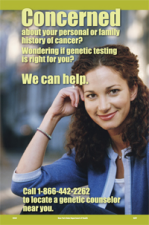Am I at Risk for Having a BRCA1 or BRCA2 Mutation?
If you are concerned about whether you have a BRCA1 or BRCA2 mutation because you or your family member has had breast or ovarian cancer, talk to your doctor or a genetic counselor. They can help determine your risk.
You may be at higher risk for having a BRCA1 or BRCA2 mutation if you have:- A personal history of:
- Breast cancer at a young age (diagnosed at age 45 or younger)
- Breast cancer at age 50 or younger AND one or more individuals on either your mother or father's side (parent, child, sibling, grandparent, aunt/uncle) with breast cancer
- Breast cancer in both breasts OR two or more tumors in the same breast
- Triple negative breast cancer at age 60 years or younger
- Breast cancer in a male
- Ovarian cancer at any age
- Pancreatic cancer or aggressive prostate cancer at any age
- A family history on either your mother's or father's side of:
- Two or more individuals in the family (parent, child, sibling, grandparent, aunt/uncle) with breast cancer
- One or more individuals in the family with breast cancer before age 50
- One or more individuals in the family with triple negative breast cancer before age 60
- One or more close male relatives with breast cancer
- One or more individuals in the family with ovarian cancer
- Two or more individuals in the family with pancreatic cancer or aggressive prostate cancer
- A confirmed BRCA1 or BRCA2 mutation
Additionally, your doctor or genetic counselor will ask you whether you are of Ashkenazi (Eastern European) Jewish descent since people with this background are at increased risk for a BRCA1 or BRCA2 mutation, even if their personal or family history doesn't meet the above criteria.
Gathering information about your family history may be difficult, even if your family is in close contact. You can discuss the information you do know in an initial meeting with the genetic counselor and ask for advice about how to best research your family medical history.
Talk to your doctor or a genetic counselor if you are concerned about your risk for a BRCA1 or BRCA2 mutation.
Reference:
Based on the National Comprehensive Cancer Network's 'Genetic/Familial High-Risk Assessment: Breast and Ovarian Cancer' clinical practice guidelines located at www.nccn.org and http://www.nccn.org/professionals/physician_gls/pdf/genetics_screening.pdf
